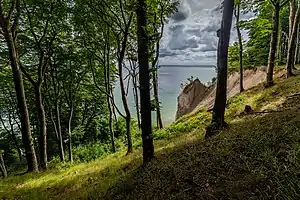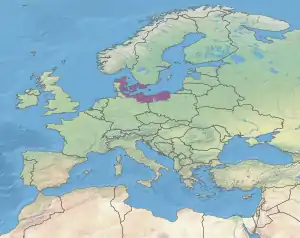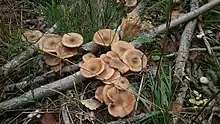Baltic mixed forests
The Baltic mixed forests is an ecoregion in Europe along the southwestern coasts of the Baltic Sea. The name was coined by the European Environment Agency and the same geographical area is designated as "Northern Europe: Germany, Denmark, Sweden, and Poland" ecoregion by the WWF.
| Baltic mixed forests | |
|---|---|
 Lowland mixed beech forest in a coastal climate (Jasmund National Park in Germany) | |
 Ecoregion PA0405 | |
| Ecology | |
| Realm | Palearctic |
| Biome | Temperate broadleaf and mixed forests |
| Borders | Sarmatic mixed forests, European Atlantic mixed forests and Central European mixed forests |
| Geography | |
| Area | 116,550 km2 (45,000 sq mi) |
| Countries | Denmark, Sweden, Germany and Poland |
| Coordinates | 54°13′N 12°56′E |
| Conservation | |
| Conservation status | Critical/Endangered |
Distribution
Despite the name, Baltic mixed forests are not found in any of the Baltic countries. These countries are instead dominated by the Sarmatic mixed forests ecoregion, with the exception of southern Lithuania, which is within the northern reaches of the Central European mixed forests.[1][2] Rather, Baltic mixed forests are found along the western and southern shores of the Baltic Sea, comprising northwestern Poland, northeastern Germany, eastern Denmark and the very southernmost tip of Sweden.[3] More specifically, they are common in lowland areas on the eastern side of the Danish peninsula and submontane areas north of the Elbe and Oder Rivers.[4]
Flora
The ecoregion's natural habitat type is lowland to submontane beech and mixed beech forests. For the beech, European beech (fagus sylvatica) is dominant. Other tree species that mix in, covers a broad array of mostly deciduous trees, but also conifer to a small extent. Oak, elm, ash, linden, maple, hazel, rowan and birch are common among the many deciduous trees mixed in with beech.[5]
 Early spring in a Baltic mixed forest
Early spring in a Baltic mixed forest Autumn and leaf fall
Autumn and leaf fall Winter
Winter.jpg.webp) The forest floor
The forest floor Beech forests are home to a plethora of fungi species (honey fungi)
Beech forests are home to a plethora of fungi species (honey fungi) European beech is predominant for the natural state of this ecoregion
European beech is predominant for the natural state of this ecoregion
Fauna
Ecological challenges
According to a 2015 study into the effect of climate change on the Baltic Sea Basin, the changes in temperature and precipitation patterns are likely to change the south-western Baltic forest's flora considerably, with a shift in the natural species composition towards more drought tolerant species, leading to a decrease in species diversity and a decrease in groundwater recharge. Similarly, the fauna of the region will also be adversely affected, due to the Baltic region's particularly sensitive nature to changes in salinity, which can have a cascading effect on food webs and interaction between aquatic and terrestrial ecosystems.[6]
References
- Röser, Dominik; Asikainen, Antti; Stupak, Inge; Parsanen, Karri (2008). "Forest Energy Resources and Potential". In Röser, Dominik; Asikainen, Antti; Raulund-Rasmussen, Karesten; Stupak, Inge (eds.). Sustainable Use of Forest Biomass for Energy: A Synthesis with Focus on the Baltic and Nordic Region. Dordrecht, Netherlands: Springer Science & Business Media. p. 11. ISBN 9781402050541.
- Pivoriunas, Danelius (2000). Ikonen, Iiro; Lammi, Antti (eds.). Traditional Rural Biotopes in the Nordic Countries, the Baltic States and the Republic of Karelia: An International Seminar and Workshop in Turku May 2-May 4, 2000. Copenhagen, Denmark: Nordic Council of Ministers. p. 47. ISBN 9789289305600.
- Maltby, E. (2009-04-27). Maltby, Edward (ed.). Functional Assessment of Wetlands: Towards Evaluation of Ecosystem Services. Woodhead Publishing in Environmental Management. Boca Raton, FL, Boston, MA, New York and Washington DC: Elsevier. pp. 111:9. ISBN 9781845695163.
- "Northern Europe: Germany, Denmark, Sweden, and Polanced". World Wildlife Fund. 1 June 2013. Retrieved 27 September 2019.
- Dinuls, Romans; Erins, Gatis; Lorencs, Aivars; Mednieks, Ints; Siņica- Siņavskis, Juris (2012-04-01). "Tree Species Identification in Mixed Baltic Forest Using LiDAR and Multispectral Data". Selected Topics in Applied Earth Observations and Remote Sensing, IEEE Journal of. 5 (2): 594–603. doi:10.1109/JSTARS.2012.2196978. S2CID 42356100.
- Pekka, Niemelä; Tolvanen, Harri; Rönkä, Mia; Kellomäki, Seppo; Krug, Joachim; Schurgers, Guy; Lehikoinen, Esa; Kalliola, Risto (2015). "Environmental Impacts—Coastal Ecosystems, Birds and Forests". In von Storch, Hans; Omstedt, Anders (eds.). Second Assessment of Climate Change for the Baltic Sea Basin. Regional Climate Studies. Cham, Switzerland: Springer. pp. 291–301. ISBN 9783319160061.
External links
| Wikimedia Commons has media related to Baltic mixed forests. |